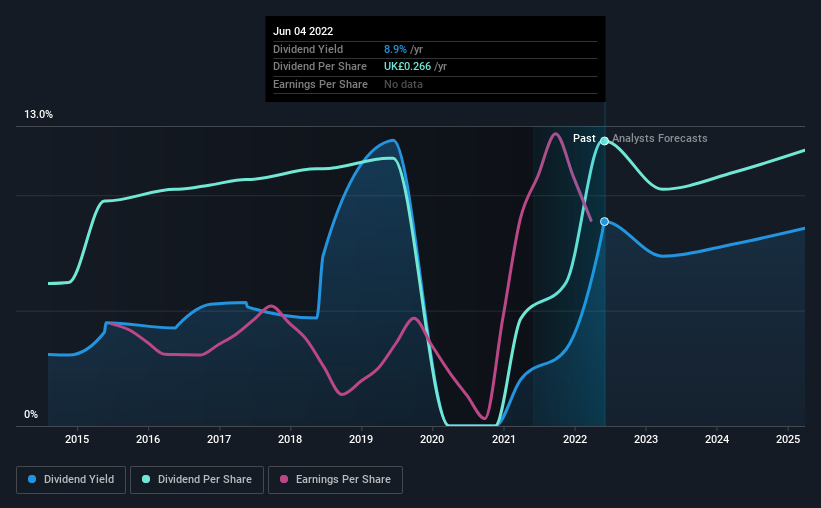Royal Mail plc (LON:RMG) has announced that it will be increasing its dividend on the 6th of September to UK£0.13. This will take the annual payment from 8.9% to 13% of the stock price, which is above what most companies in the industry pay.
Check out our latest analysis for Royal Mail
Royal Mail Is Paying Out More Than It Is Earning
If the payments aren't sustainable, a high yield for a few years won't matter that much. However, prior to this announcement, Royal Mail's dividend was comfortably covered by both cash flow and earnings. This means that most of what the business earns is being used to help it grow.
Over the next year, EPS is forecast to fall by 47.7%. If the dividend continues along recent trends, we estimate the payout ratio could reach 105%, which could put the dividend in jeopardy if the company's earnings don't improve.

Royal Mail's Dividend Has Lacked Consistency
Looking back, Royal Mail's dividend hasn't been particularly consistent. If the company cuts once, it definitely isn't argument against the possibility of it cutting in the future. The dividend has gone from UK£0.13 in 2014 to the most recent annual payment of UK£0.27. This implies that the company grew its distributions at a yearly rate of about 9.1% over that duration. We like to see dividends have grown at a reasonable rate, but with at least one substantial cut in the payments, we're not certain this dividend stock would be ideal for someone intending to live on the income.
The Dividend Looks Likely To Grow
With a relatively unstable dividend, it's even more important to evaluate if earnings per share is growing, which could point to a growing dividend in the future. Royal Mail has seen EPS rising for the last five years, at 18% per annum. Growth in EPS bodes well for the dividend, as does the low payout ratio that the company is currently reporting.
We Really Like Royal Mail's Dividend
Overall, a dividend increase is always good, and we think that Royal Mail is a strong income stock thanks to its track record and growing earnings. The distributions are easily covered by earnings, and there is plenty of cash being generated as well. If earnings do fall over the next 12 months, the dividend could be buffeted a little bit, but we don't think it should cause too much of a problem in the long term. All in all, this checks a lot of the boxes we look for when choosing an income stock.
Companies possessing a stable dividend policy will likely enjoy greater investor interest than those suffering from a more inconsistent approach. At the same time, there are other factors our readers should be conscious of before pouring capital into a stock. For example, we've identified 3 warning signs for Royal Mail (1 is potentially serious!) that you should be aware of before investing. Is Royal Mail not quite the opportunity you were looking for? Why not check out our selection of top dividend stocks.
New: AI Stock Screener & Alerts
Our new AI Stock Screener scans the market every day to uncover opportunities.
• Dividend Powerhouses (3%+ Yield)
• Undervalued Small Caps with Insider Buying
• High growth Tech and AI Companies
Or build your own from over 50 metrics.
Have feedback on this article? Concerned about the content? Get in touch with us directly. Alternatively, email editorial-team (at) simplywallst.com.
This article by Simply Wall St is general in nature. We provide commentary based on historical data and analyst forecasts only using an unbiased methodology and our articles are not intended to be financial advice. It does not constitute a recommendation to buy or sell any stock, and does not take account of your objectives, or your financial situation. We aim to bring you long-term focused analysis driven by fundamental data. Note that our analysis may not factor in the latest price-sensitive company announcements or qualitative material. Simply Wall St has no position in any stocks mentioned.
About LSE:IDS
International Distribution Services
Operates as a universal postal service provider in the United Kingdom and internationally.
Good value with adequate balance sheet.
Similar Companies
Market Insights
Community Narratives




